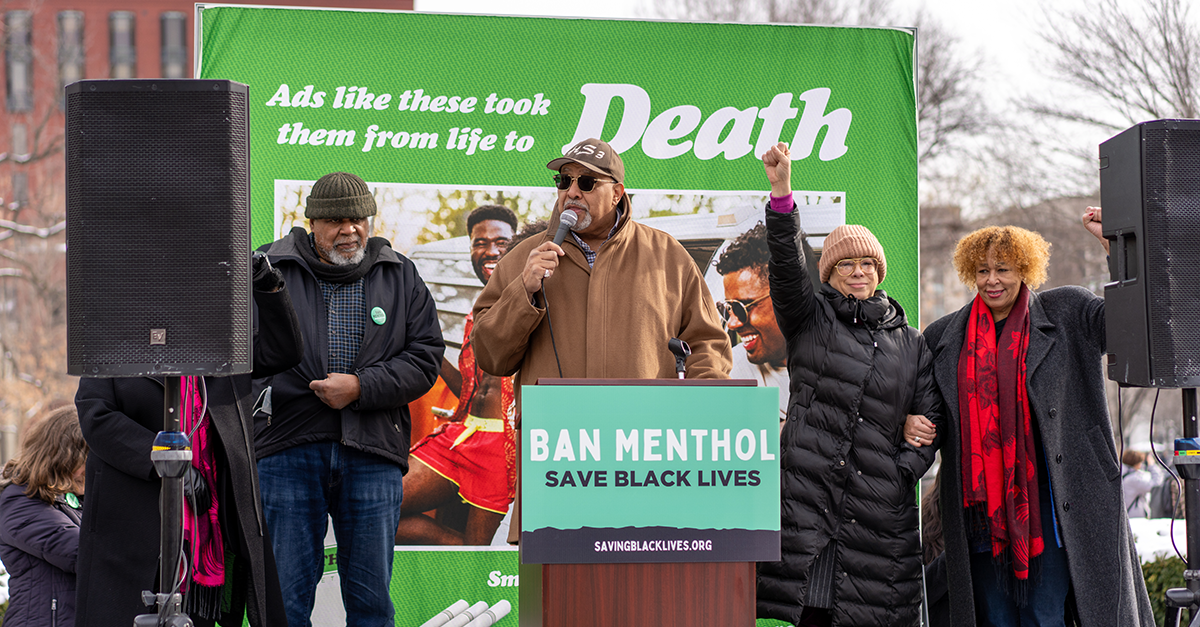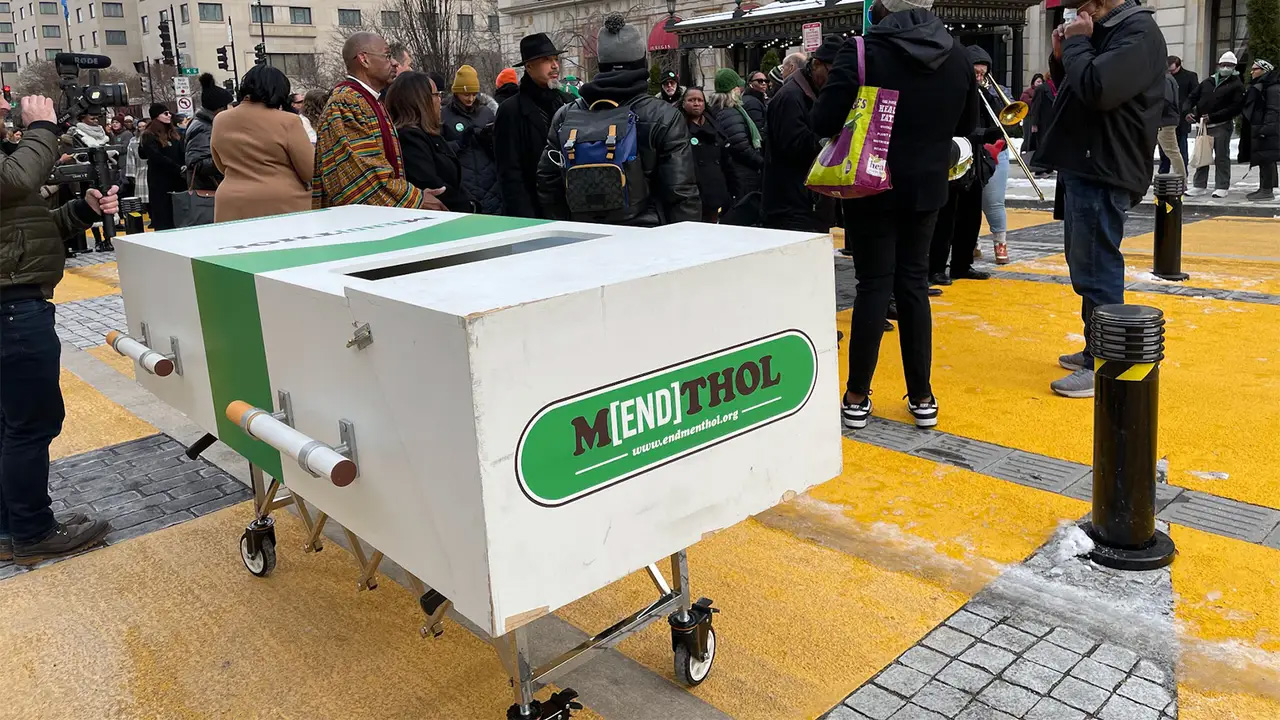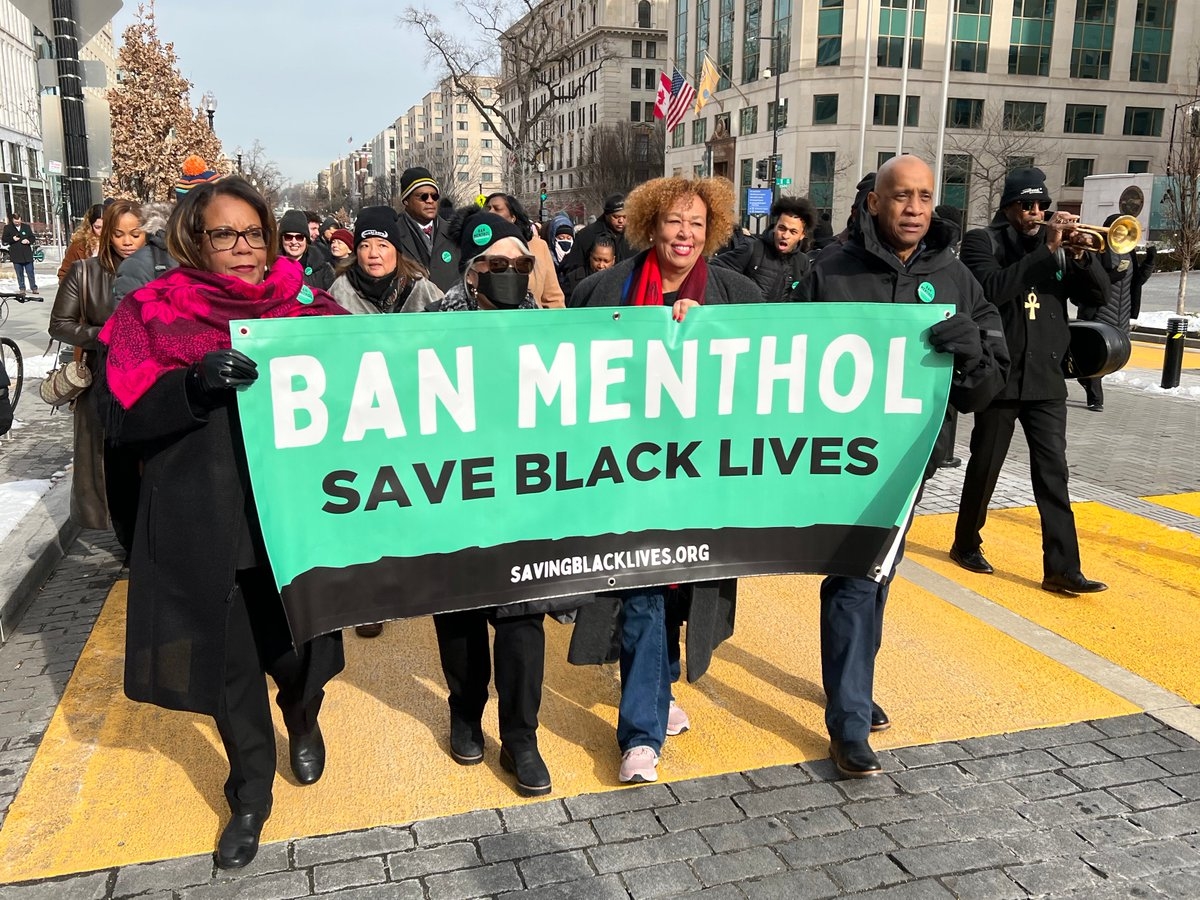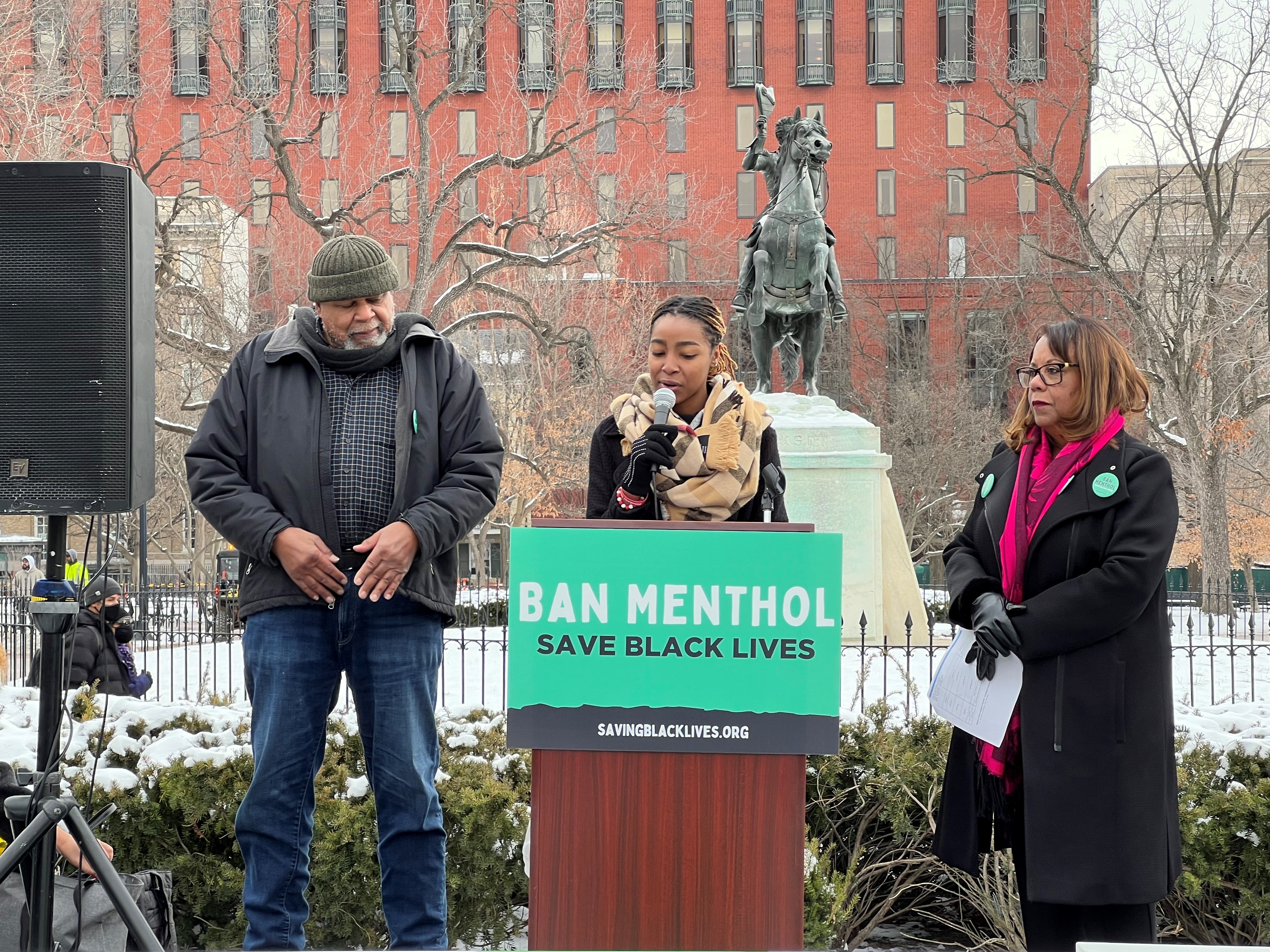Public health and civil rights groups call on White House to stop delaying and end menthol cigarette sales
Public health and civil rights groups gathered for a “Menthol Funeral” to protest the administration’s delay in finalizing the Food and Drug Administration’s rules to eliminate menthol cigarettes and mourn the many Black Americans who die each year from smoking-related diseases.
The New Orleans-style jazz funeral procession, featuring live music and a faux casket designed to resemble a box of menthol cigarettes, made its way from Black Lives Matter Plaza to the White House where representatives from public health and civil rights organizations took the stage to demand action on menthol cigarettes; the last remaining flavored cigarette still sold in the U.S. that has long been marketed to Black Americans using predatory tactics.
Ending the sale of menthol cigarettes, which have been repeatedly exempted from rules on flavored tobacco products, has been long-awaited since the FDA announced the proposal in April 2021. Nearly six weeks after Biden’s administration announced another delay in finalizing the FDA’s proposal to lay menthol to rest, leaders in public health and civil rights came together to say: enough is enough.
The January 18 funeral organized by the African American Tobacco Control Leadership Council featured speakers from public health and civil rights organizations who rallied around key issues, including calling out the tobacco industry for their harmful marketing tactics, blatant disregard for lives lost, and rampant spread of misinformation. With the White House in view, leaders called on the Biden administration to finalize the rules immediately.
The tobacco industry has strategically targeted Black Americans with menthol cigarettes
Most Black smokers use menthols, in part due to decades of heavy marketing of menthol cigarettes in Black neighborhoods, in Black publications, and at Black cultural events. Menthol cigarettes were responsible for 378,000 premature deaths over the 38-year period from 1980 to 2018, according to a February 2021 study published in Tobacco Control. Of those premature deaths, 157,000 were among Black Americans.
“Why, in 2024, are we even debating whether businesses should be able to sell a product that kills…?” asked Eric Batch, American Heart Association Vice President of Field Advocacy for the Western Region.
Menthol cigarettes are easier to smoke and more difficult to quit, because the flavor reduces the harshness of the cigarette smoke and suppresses the coughing reflex. According to numerous studies, young people are more likely to smoke a menthol cigarette as their first cigarette rather than a non-menthol cigarette, and those who start with menthol cigarettes first are also more likely to continue smoking. In 2023, 40.4% of middle school and high school students who currently smoked cigarettes reported using menthol cigarettes, according to the National Youth Tobacco Survey.
"This action has the potential to save lives now, and protect potential future generations like mine from nicotine addiction and reduce health inequalities nationwide,” said Nia Naylor, student body president of Howard University and a truth community leader. “Black people deserve to live long, healthy lives and this is one step we can take forward, improving health outcomes for everyone.”
The tobacco industry has fueled false claims that eliminating menthol cigarettes will put Black Americans at greater risk from law enforcement
The tobacco industry has attempted to spread fear that a rule to eliminate menthol products would unfairly target Black Americans and would lead to further criminalization of the community.
For example, the maker of the leading menthol brand Newport, R.J. Reynolds, recruited prominent Black leaders including civil rights activist Rev. Al Sharpton to host town halls on the subject. The FDA has repeatedly stated that enforcement of the rules would be focused on manufacturers and retailers, not individual consumers.
“The FDA enforcement is not against individual possession or use of menthol cigarettes, but against the companies that profit from our suffering.” said Wisdom Cole, national director of the youth and college division at the NAACP.
Rev. Horace Sheffield, a pastor with Detroit's New Destiny Christian Fellowship whose mother smoked menthols and died from a heart attack when the reverend was young, refused to accept tobacco industry funds when RJ Reynolds asked him to advocate on their behalf. “If we are to be truly free in this great land of opportunity” he said, “we must do away with corporate greed which keeps us in chains and allows us to purchase our death a package at a time and which kills us a puff at a time.” When it came to accepting funds from the tobacco industry, he said, “You can’t pay me enough. You can’t bribe me enough. So I’ve come to say enough is enough. I’m here because we’ve got to do something about what is doing this to us.”

“The FDA enforcement is not against individual possession or use of menthol cigarettes, but against the companies that profit from our suffering.” - Wisdom Cole, NAACP, National Director of the Youth & College Division
Eliminating menthol is essential to closing the gap in tobacco-related death and disease
As leaders from the African American Tobacco Control Leadership Council, NAACP, The Center for Black Health and Equity, Campaign for Tobacco-Free Kids, and other organizations took to the stage, they demanded urgency and mourned the lives that have been lost in the 15 years since the FDA removed flavors from cigarettes but left menthol on the shelves.
Speakers also noted that eliminating menthol is integral to the success of Biden’s Cancer Moonshot initiative, which aims to prevent more than 4 million cancer deaths by 2047. Removing menthol is critical to meeting this goal, said John Bowman, executive vice president for U.S. programs at the Campaign for Tobacco-Free Kids.
Black smokers have a harder time quitting smoking and die at higher rates from tobacco-related diseases such as cancer, heart disease, and stroke. "Any further delay continues to benefit industry at the expense of Black lives," Bowman said. A recent analysis by researchers at the Council on Foreign Relations found that the removal of menthol would eliminate the disparity in lung cancer death rates between Black Americans and other U.S. racial and ethnic groups within five years – 25 years sooner than it would otherwise happen.
CDC data collected in 2021 show that most U.S. adults (62.3%) support policies to eliminate menthol cigarettes. Another study found that 47% of Black American menthol smokers intended to quit if menthols were no longer available.
Millie Martinez, a former menthol smoker who documented her journey to quit smoking in a video blog with the EX Program, a digital quit-smoking plan and online community developed by Truth Initiative in collaboration with Mayo Clinic, spoke directly to menthol smokers who want to quit. “Nobody should have to do this alone,” she said. “We need the government to make sure everyone has the help they need to quit... we cannot let the next generation of young people be exposed to these deadly and addictive products. It’s time to lay menthol cigarettes to rest.”
The research is clear: the removal of menthol cigarettes and cigars in the U.S. would reduce overall smoking by 15% by 2026, and would reduce cumulative deaths from smoking by 650,000 (5%) by 2060, according to a 2022 study. Not only would the removal of menthol save lives, but it would help address tobacco-related health inequalities that have existed for decades.
“We will bury this menthol killer” pledged Phil Gardiner, co-chair of the African American Tobacco Control Leadership Council. It’s time to put “public health over politics,” he said, and finalize the menthol rules.
More in traditional tobacco products
Want support quitting? Join EX Program
By clicking JOIN, you agree to the Terms, Text Message Terms and Privacy Policy.
Msg&Data rates may apply; msgs are automated.





